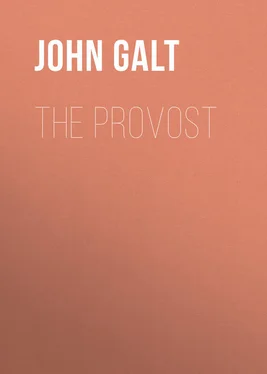John Galt - The Provost
Здесь есть возможность читать онлайн «John Galt - The Provost» — ознакомительный отрывок электронной книги совершенно бесплатно, а после прочтения отрывка купить полную версию. В некоторых случаях можно слушать аудио, скачать через торрент в формате fb2 и присутствует краткое содержание. Жанр: foreign_antique, foreign_prose, на английском языке. Описание произведения, (предисловие) а так же отзывы посетителей доступны на портале библиотеки ЛибКат.
- Название:The Provost
- Автор:
- Жанр:
- Год:неизвестен
- ISBN:нет данных
- Рейтинг книги:5 / 5. Голосов: 1
-
Избранное:Добавить в избранное
- Отзывы:
-
Ваша оценка:
- 100
- 1
- 2
- 3
- 4
- 5
The Provost: краткое содержание, описание и аннотация
Предлагаем к чтению аннотацию, описание, краткое содержание или предисловие (зависит от того, что написал сам автор книги «The Provost»). Если вы не нашли необходимую информацию о книге — напишите в комментариях, мы постараемся отыскать её.
The Provost — читать онлайн ознакомительный отрывок
Ниже представлен текст книги, разбитый по страницам. Система сохранения места последней прочитанной страницы, позволяет с удобством читать онлайн бесплатно книгу «The Provost», без необходимости каждый раз заново искать на чём Вы остановились. Поставьте закладку, и сможете в любой момент перейти на страницу, на которой закончили чтение.
Интервал:
Закладка:
Such was the account and narration that the bailie gave to me of the particulars o’ his journey to London; and when he was done, I could not but make a moral reflection or two, on the policy of gentlemen putting themselves on the leet to be members of Parliament; it being a clear and plain thing, that as they are sent up to London for the benefit of the people by whom they are chosen, the people should always take care to get some of that benefit in hand paid down, otherwise they run a great risk of seeing their representatives neglecting their special interests, and treating them as entitled to no particular consideration.
CHAPTER VIII – ON THE CHOOSING OF A MINISTER
The next great handling that we had in the council after the general election, was anent the choice of a minister for the parish. The Rev. Dr Swapkirk having had an apoplexy, the magistrates were obligated to get Mr Pittle to be his helper. Whether it was that, by our being used to Mr Pittle, we had ceased to have a right respect for his parts and talents, or that in reality he was but a weak brother, I cannot in conscience take it on me to say; but the certainty is, that when the Doctor departed this life, there was hardly one of the hearers who thought Mr Pittle would ever be their placed minister, and it was as far at first from the unanimous mind of the magistrates, who are the patrons of the parish, as any thing could well be, for he was a man of no smeddum in discourse. In verity, as Mrs Pawkie, my wife, said, his sermons in the warm summer afternoons were just a perfect hushabaa, that no mortal could hearken to without sleeping. Moreover, he had a sorning way with him, that the genteeler sort could na abide, for he was for ever going from house to house about tea-time, to save his ain canister. As for the young ladies, they could na endure him at all, for he had aye the sough and sound of love in his mouth, and a round-about ceremonial of joking concerning the same, that was just a fasherie to them to hear. The commonality, however, were his greatest adversaries; for he was, notwithstanding the spareness of his abilities, a prideful creature, taking no interest in their hamely affairs, and seldom visiting the aged or the sick among them. Shortly, however, before the death of the doctor, Mr Pittle had been very attentive to my wife’s full cousin, Miss Lizy Pinkie, I’ll no say on account of the legacy of seven hundred pounds left her by an uncle that made his money in foreign parts, and died at Portsmouth of the liver complaint, when he was coming home to enjoy himself; and Mrs Pawkie told me, that as soon as Mr Pittle could get a kirk, I needna be surprised if I heard o’ a marriage between him and Miss Lizy.
Had I been a sordid and interested man, this news could never have given me the satisfaction it did, for Miss Lizy was very fond of my bairns, and it was thought that Peter would have been her heir; but so far from being concerned at what I heard, I rejoiced thereat, and resolved in secret thought, whenever a vacancy happened, Dr Swapkirk being then fast wearing away, to exert the best of my ability to get the kirk for Mr Pittle, not, however, unless he was previously married to Miss Lizy; for, to speak out, she was beginning to stand in need of a protector, and both me and Mrs Pawkie had our fears that she might outlive her income, and in her old age become a cess upon us. And it couldna be said that this was any groundless fear; for Miss Lizy, living a lonely maiden life by herself, with only a bit lassie to run her errands, and no being naturally of an active or eydent turn, aften wearied, and to keep up her spirits gaed may be, now and then, oftener to the gardevin than was just necessar, by which, as we thought, she had a tavert look. Howsever, as Mr Pittle had taken a notion of her, and she pleased his fancy, it was far from our hand to misliken one that was sib to us; on the contrary, it was a duty laid on me by the ties of blood and relationship, to do all in my power to further their mutual affection into matrimonial fruition; and what I did towards that end, is the burden of this current chapter.
Dr Swapkirk, in whom the spark of life was long fading, closed his eyes, and it went utterly out, as to this world, on a Saturday night, between the hours of eleven and twelve. We had that afternoon got an inkling that he was drawing near to his end. At the latest, Mrs Pawkie herself went over to the manse, and stayed till she saw him die. “It was a pleasant end,” she said, for he was a godly, patient man; and we were both sorely grieved, though it was a thing for which we had been long prepared; and indeed, to his family and connexions, except for the loss of the stipend, it was a very gentle dispensation, for he had been long a heavy handful, having been for years but, as it were, a breathing lump of mortality, groosy, and oozy, and doozy, his faculties being shut up and locked in by a dumb palsy.
Having had this early intimation of the doctor’s removal to a better world, on the Sabbath morning when I went to join the magistrates in the council-chamber, as the usage is to go to the laft, with the town-officers carrying their halberts before us, according to the ancient custom of all royal burghs, my mind was in a degree prepared to speak to them anent the successor. Little, however, passed at that time, and it so happened that, by some wonder of inspiration, (there were, however, folk that said it was taken out of a book of sermons, by one Barrow an English Divine,) Mr Pittle that forenoon preached a discourse that made an impression, in so much, that on our way back to the council-chamber I said to Provost Vintner, that then was —
“Really Mr Pittle seems, if he would exert himself, to have a nerve. I could not have thought it was in the power of his capacity to have given us such a sermon.”
The provost thought as I did, so I replied – “We canna, I think, do better than keep him among us. It would, indeed, provost, no be doing justice to the young man to pass another over his head.”
I could see that the provost wasna quite sure of what I had been saying; for he replied, that it was a matter that needed consideration.
When we separated at the council-chamber, I threw myself in the way of Bailie Weezle, and walked home with him, our talk being on the subject of vacancy; and I rehearsed to him what had passed between me and the provost, saying, that the provost had made no objection to prefer Mr Pittle, which was the truth.
Bailie Weezle was a man no overladen with worldly wisdom, and had been chosen into the council principally on account of being easily managed. In his business, he was originally by trade a baker in Glasgow, where he made a little money, and came to settle among us with his wife, who was a native of the town, and had her relations here. Being therefore an idle man, living on his money, and of a soft and quiet nature, he was for the reason aforesaid chosen into the council, where he always voted on the provost’s side; for in controverted questions every one is beholden to take a part, and he thought it was his duty to side with the chief magistrate.
Having convinced the bailie that Mr Pittle had already, as it were, a sort of infeoffment in the kirk, I called in the evening on my old predecessor in the guildry, Bailie M’Lucre, who was not a hand to be so easily dealt with; but I knew his inclinations, and therefore I resolved to go roundly to work with him. So I asked him out to take a walk, and I led him towards the town-moor, conversing loosely about one thing and another, and touching softly here and there on the vacancy.
When we were well on into the middle of the moor, I stopped, and, looking round me, said, “Bailie, surely it’s a great neglec of the magistrates and council to let this braw broad piece of land, so near the town, lie in a state o’ nature, and giving pasturage to only twa-three of the poor folk’s cows. I wonder you, that’s now a rich man, and with eyne worth pearls and diamonds, that ye dinna think of asking a tack of this land; ye might make a great thing o’t.”
Читать дальшеИнтервал:
Закладка:
Похожие книги на «The Provost»
Представляем Вашему вниманию похожие книги на «The Provost» списком для выбора. Мы отобрали схожую по названию и смыслу литературу в надежде предоставить читателям больше вариантов отыскать новые, интересные, ещё непрочитанные произведения.
Обсуждение, отзывы о книге «The Provost» и просто собственные мнения читателей. Оставьте ваши комментарии, напишите, что Вы думаете о произведении, его смысле или главных героях. Укажите что конкретно понравилось, а что нет, и почему Вы так считаете.












